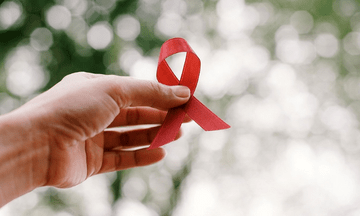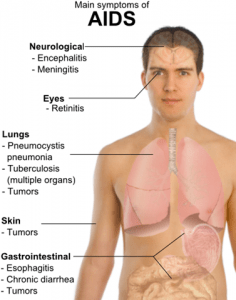World AIDS Day

The Human Immunodeficiency Virus (HIV) is a retrovirus which targets our immune system. It weakens our defence mechanisms against infections and some types of cancers. The virus damages the cells of the immune system, and the immune system loses its ability to fight infections. By measuring the CD4 cell count, we can assess the functioning of the immune system in infected individuals. Acquired immunodeficiency syndrome (AIDS), is the advanced stage of HIV infection.
The symptoms of the disease vary depending on the stage of infection. Infected individuals tend to have the highest chance of transmission in the initial few months after acquiring the infection. Most of them are not aware of their infected status. Once the individual develops AIDS, he/she develops certain infections or cancers which are difficult to treat and often lead to adverse outcomes. Thus, timely diagnosis and treatment with Antiretroviral therapy (ART) play key roles in ensuring that individuals lead near-normal lives.

Individuals who undergo treatment do not transmit the infection to their partners as they are virally suppressed. HIV can be transmitted via the exchange of a variety of body fluids from infected individuals, but not through ordinary day-to-day contacts such as kissing, hugging, shaking hands or sharing personal objects, food or water.
Earlier, only those with low CD4 counts were started on ART. Since 2016, WHO has recommended that all people living with HIV be provided with lifelong ART irrespective of their CD4 count. By June 2022, 189 countries had already adopted this recommendation, covering 99% of all people living with HIV globally.
In India, HIV prevalence (15-49 years) has declined from 0.55% in 2000 to 0.21% in 2021.
There are several issues faced by infected individuals’ right from adverse effects due to ART to opportunistic infections to cancers. While these problems are often discussed, neuropsychiatric disorders are rarely addressed in HIV patients. The causes are multifactorial and could be due to direct effects of the virus, personality vulnerabilities, addictions, or responses to the social isolation and disenfranchisement that are frequently associated with the diagnosis of HIV. Many individuals have difficulty with treatment adherence due to their behaviour patterns. Thus, it is important for all HIV-infected individuals to have a good support system in the form of their family members, NGOs or a counsellor. Any behavioural abnormalities can be identified early on and managed appropriately to ensure timely treatment.
A lesser-known fact is that there are several vaccines which can be given to HIV patients to prevent them from getting certain infections. The influenza vaccine must be taken yearly to protect against the seasonal flu. Tdap vaccine offers protection against whooping cough and tetanus. The Pneumococcal vaccine and Meningococcal conjugate vaccine prevent Pneumonia and Meningococcal disease respectively. Those under the age of 26 can take the HPV vaccine to protect against Papillomaviruses. The Hepatitis B vaccine can protect against Hepatitis B virus infection. These vaccines can be taken in consultation with the concerned doctors.
A healthy lifestyle, healthy diet and exercise, and taking medicines regularly can ensure that the infected individuals have a better quality of life. With the emergence of antimicrobial resistance, managing this disease will only get more challenging in the future. Increased lifespan also makes them more susceptible to infections, thus increasing the importance of preventive measures.
Our best bet is to educate the public on preventive strategies to decrease the incidence of HIV. Healthcare workers must take post-exposure prophylaxis whenever they get exposed to HIV-positive individuals’ body fluids in the form of pricks or splashes. Ensuring compliance to ART in the already infected individuals, timely diagnosis and treatment and spreading awareness are key measures in the ‘last mile’ towards the AIDS ‘End-Game’.
We, at Ramaiah Hospital, treat HIV patients like any other patient and ensure that their treatment is as per protocol without any stigma or discrimination.
Dr Parinitha Kaza
Head Clinical Microbiology and Hospital infection control RMH


